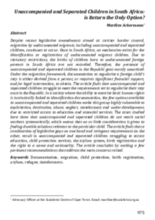Abstract
Despite recent legislative amendments aimed at stricter border control, migration by undocumented migrants, including unaccompanied and separated children, continues to occur. Once in South Africa, no mechanism exists for the identification or registration of undocumented migrant children. Due to statutory restrictions, the births of children born to undocumented foreign parents in South Africa are not recorded. Therefore, the presence of unaccompanied and separated children in the Republic goes mostly unnoticed. Under the migration framework, documentation to regularise a foreign child’s stay is either derived from a parent, or requires significant financial support, and/or legal intervention, to obtain. The article finds that unaccompanied and separated children struggle to meet the requirements set to regularise their stay once in the Republic. In a society where the ability to exercise basic human rights is intrinsically linked to identification documentation, the few options available to unaccompanied and separated children make this group highly vulnerable to exploitation, destitution, abuse, neglect, statelessness and under-development, due to restricted access to education and essential services. The cases studied here show that unaccompanied and separated children do not reach social workers systematically, which means that no or little consideration is given to finding durable solutions relevant to the particular child. The article finds that a combination of legislative gaps on one hand and stringent requirements on the other, result in unaccompanied and separated children struggling to access education, child protection services, the asylum system, birth registration and the right to a name and nationality. The article concludes by making a few pertinent recommendations that address the main concerns raised.

